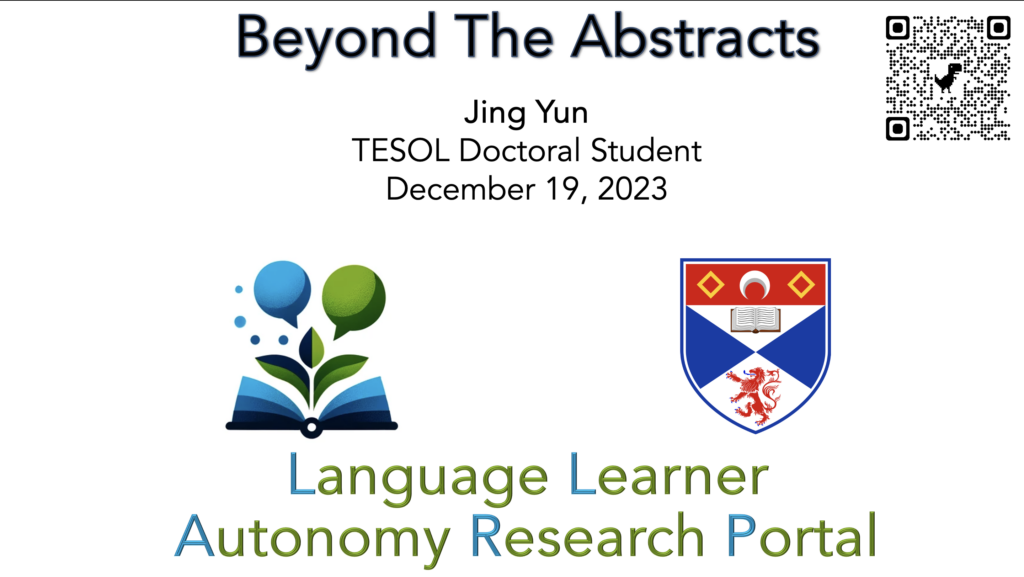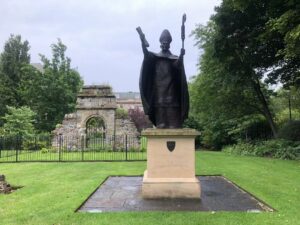Researcher Interviews
Navigation Top
– Beyond The Abstracts: Systematic Literature Reviews and Language Advising- Jing Yun (March 2024)
– Beyond The Abstracts: Autonomy and Self-Regulated Learning- Ayako Kobayashi (February 2024)
– Beyond The Abstracts: Language Policy in Self-Access Learning– Katherine Thornton (January 2024)
Beyond The Abstracts: Systematic Literature Reviews and Language Advising- Jing Yun (March 2024)
In this Beyond The Abstracts conversation I speak with Jing Yun. Jing is studying for a Doctor of Professional Practice in TESOL at International Education Institute, University of St Andrews. She obtained an MA in Applied Linguistics with TESOL at the University of Sheffield and a second MA in Cultural Studies at KU Leuven. Her research interests include intercultural communication, task-based language teaching, learner autonomy, and language advising. Jing also recently published a protocol for a scoping review of advising in language education, about which we speak. We cover her personal route into her research theme, the rationale behind a systematic literature review of this field, and her first-hand experiences with methodological issues such as question development, data extraction, and protocol writing. We also cover definitions and geographical distribution of language advising, the roles of personalisation and learner differences, and the relationship between advising and autonomy. This conversation will be essential viewing for anyone with an interest in these areas.
And now, here is my conversation with Jing Yun:

Learn more about Jing Yun’s work here:
- Yun, J., & Chong , S. W. (2023). A protocol for a scoping review of advising in language education. (IDESR000061 ed.) International Database of Education Systematic Reviews. https://idesr.org/article/IDESR000061
- Yun, J., & Chong , S. W. (2023). A task-based approach to one-on-one teaching. Modern English Teacher. https://www.modernenglishteacher.com/a-task-based-approach-to-one-on-one-teaching


Beyond The Abstracts: Autonomy and Self-Regulated Learning- Ayako Kobayashi (February 2024)
In this Beyond The Abstracts conversation I speak with (香林綾子)Ayako Kobayashi. Ayako is an Assistant Professor in the department of International Tourism at Heian Jogakuin (St Agnes’) University, Kyoto, Japan. In addition to teaching and learning materials development for listening and presentation, she is a member of the Japan Association of College English Teachers (JACET), conducts research on language learner autonomy, and is the author of a new book on self-regulated learning. In the conversation, we cover Ayako’s background, motivation, and research journey. We also look at themes from her published work in the field of autonomy and self-regulated learning. This conversation will be essential reading for anyone with an interest in these areas.
And now, here is my conversation with Ayako Kobayashi.
Learn more about Ayako Kobayashi’s work here:
-
Kobayashi, A. (2011). Teachers’ Perceived Use and Importance of Metacognitive Instruction Techniques in Japanese EFL Classrooms. ARELE: Annual Review of English Language Education in Japan, 22, 185-200. https://doi.org/10.20581/arele.22.0_185
-
Kobayashi, A. (2020). Fostering Learner Autonomy in an EFL Classroom Through an Action Research by Adapting Extensive Listening Activities. Language Education & Technology, 57(0), 91-120. https://doi.org/10.24539/let.57.0_91
- Kobayashi, A. (2023). Investigating the effects of self-regulated learning instruction in Japanese EFL classrooms : promoting learner autonomy. Kinseido. https://cir.nii.ac.jp/crid/1130296563708312075
Beyond The Abstracts: Language Policy in Self-Access Learning– Katherine Thornton (January 2024)
In this Beyond The Abstracts conversation I speak with Katherine Thornton. Katherine is an Associate Professor at the Institute for General Education of Otemon Gakuin University, Osaka, Japan. In addition to teaching and working as a learning advisor, she is also Program Director of their Self-Access Learning Center, known as E-CO. Katherine is also the President of the Japan Association for Self-Access Learning (JASAL).
Click the image to watch the conversation:

We cover Katherine’s education, background, and negotiation of professional, personal, and research identities, and her advice for early career scholars in the fields of autonomy or self-access learning. We also delve into her research on language policy and self-access: exploring what it is and why it is important, the relationship between language policy and local user needs, and multilingualism in self-access learning spaces in Japan. Lastly, we cover Katherine’s ideas about the current state and future of the field of self-access learning. This conversation will be essential viewing for anyone with an interest in these areas.
Learn more about Katherine’s work here:
- Thornton, K. (2018). Language policy in non-classroom language learning spaces. Studies in Self-Access Learning Journal, 9(2), 156-178.
- Thornton, K. (2020). Student Attitudes to Language Policy in Language Learning Spaces. JASAL Journal, 1(2), 3–23.
- Thornton, K. (2023). Linguistic diversity in self-access learning spaces in Japan: A growing role for languages other than English? Studies in Self-Access Learning Journal, 14(2), 201–231.
You may also like: Educational Practitioner Interviews
